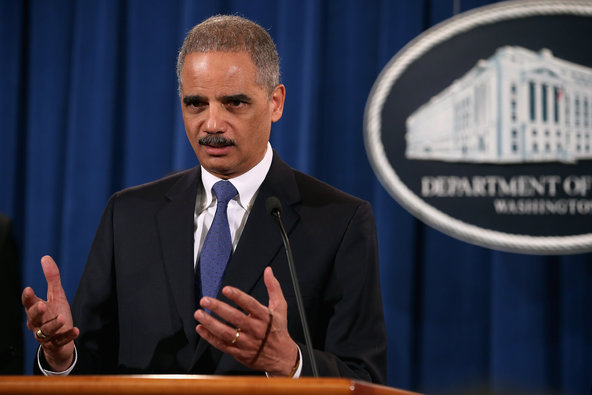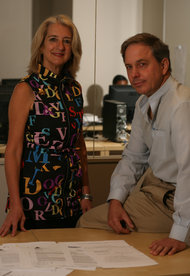 Chip Somodevilla/Getty ImagesAttorney General Eric H. Holder Jr. announced the civil fraud charges against S.P. in Washington on Tuesday.
Chip Somodevilla/Getty ImagesAttorney General Eric H. Holder Jr. announced the civil fraud charges against S.P. in Washington on Tuesday.
The subprime loans packaged as complex securities for Standard Poor’s to rate were already failing at such a fast clip in the fall of 2006 that some analysts at the firm thought they must be seeing typographical errors.
At the time, the nation’s biggest rating agency was making record profits, attaching sterling ratings to mortgage-related securities that were increasingly going bad. Inside the firm’s headquarters in Lower Manhattan, tensions were escalating. Some executives pushed to revise the firm’s rating models in hopes of preserving market share and profits, while others expressed deep concerns about the poor performance of the securities, according to court records.
“This market is a wildly spinning top which is going to end badly,” one executive wrote in a confidential memo.
Related Links
 Documents: U.S. Accuses S.P. of Fraud
Documents: U.S. Accuses S.P. of Fraud- S.P. Calls Government’s Suit ‘Meritless’
- The Things Credit-Rating Analysts Say
- Henning and Davidoff: Justice Department Faces Uphill Battle in Proving S. P. Fraud
- News Analysis: Financial Models at the Heart of Lawsuit Against S.P.
The account, culled from reams of internal e-mails, is part of civil fraud charges that the Justice Department filed late Monday against S.P. in federal court in Los Angeles, accusing the firm of inflating ratings of mortgage investments and setting them up for a crash when the financial crisis struck.
The government is seeking $5 billion in penalties against the company to cover losses to investors like state pension funds and federally insured banks and credit unions. The amount would be more than five times what S.P. made in 2011. S.P. said it would vigorously defend itself against “these unwarranted claims.”
Sixteen states, including Iowa, Mississippi and Illinois, joined the federal suit, and the New York attorney general said he was taking separate actions. California’s attorney general, Kamala D. Harris, said the state pension funds lost nearly $1 billion on the soured investments. The Securities and Exchange Commission has also been investigating possible wrongdoing at S.P.
“The action we announce today marks an important step forward in the administration’s ongoing effort to investigate — and punish — the conduct that is believed to have continued to the worst economic crisis in recent history,” said Mr. Holder. The Justice Department called its investigation “Alchemy,” after medieval alchemists’ attempts to turn lead into gold.
Standard Poor’s defended its corporate practices on Tuesday, saying the civil lawsuit filed by the Justice Department was “meritless.”
“Claims that we deliberately kept ratings high when we knew they should be lower are simply not true. S.P. has always been committed to serving the interests of investors and all market participants by providing independent opinions on creditworthiness based on available information,” the rating agency said in a statement on Tuesday.
The company said that at all times its actions reflected its best judgments about the investments at the heart of the suit — about 40 collateralized debt obligations, or C.D.O.’s, an exotic type of security made up of bundles of residential mortgage-backed securities, which in turn were composed of individual home loans.
“Unfortunately,” the company’s statement said, “S.P., like everyone else, did not predict the speed and severity of the coming crisis and how credit quality would ultimately be affected.”
McGraw-Hill shares were down 5 percent to $47.51 in early afternoon trading on the New York Stock Exchange, and have lost 19 percent of their value over the last two days.
The case is the first significant federal action against the ratings industry, which during the boom years bestowed high ratings that made many mortgage-related investments appear safer than they actually were.
It was unclear whether the Justice Department was looking at the other two major ratings agencies, Moody’s Investors Service and Fitch. Mr. West said he would not discuss actions against other rating agencies. In addition to joining the suit against S.P., James Hood, the attorney general in Mississippi, said his state had also filed lawsuit against Moody’s.
The joint federal-state suit against S.P. claims that from September 2004 through October 2007, S.P. “knowingly and with the intent to defraud, devised, participated in and executed a scheme to defraud investors” in certain mortgage-related securities. S.P. also falsely represented that its ratings “were objective, independent, uninfluenced by any conflicts of interest,” the suit said.
Settlement talks between S.P. and the Justice Department broke down in the last two weeks after prosecutors sought a penalty in excess of $1 billion and insisted that the company admit wrongdoing, several people with knowledge of the talks said. That amount would wipe out the profits of McGraw-Hill for an entire year. S.P. had proposed a settlement of around $100 million, the people said. The government pressed for an admission of guilt to at least one count of fraud, said the people. S.P. told prosecutors it could not admit guilt without exposing itself to liability in a multitude of civil cases.
On Monday, a spokesman for Moody’s declined to comment. A spokesman for Fitch, Daniel J. Noonan, said the agency could not comment on an action against Standard Poor’s, but added, “We have no reason to believe Fitch is a target of any such action.”
The securities were created at the height of the housing boom, mainly for investment banks. S.P. was paid fees of about $13 million for rating them. The firm gave the government more than 20 million pages of e-mails as part of its investigation, the people with knowledge of the process said.
Since the financial crisis in 2008, the ratings agencies’ business practices have been widely criticized, and questions have been raised as to whether independent analysis was corrupted by Wall Street’s push for profits.
A Senate investigation made public in 2010 found that S. P. and Moody’s used inaccurate rating models from 2004 to 2007 that failed to predict how high-risk mortgages would perform, allowed competitive pressures to affect their ratings and failed to reassess past ratings after improving their models in 2006.
The companies failed to assign adequate staff to examine exotic investments, and failed to take mortgage fraud, lax underwriting and “unsustainable home price appreciation” into account in their models, the inquiry found.
“Rating agencies continue to create an even bigger monster — the C.D.O. market,” one S.P. employee wrote in an internal e-mail in December 2006. “Let’s hope we are all wealthy and retired by the time this house of cards falters.”
Another S.P. employee wrote in an instant message the next April, reproduced in the complaint: “We rate every deal. It could be structured by cows and we would rate it.”
In its statement Tuesday, S.P. said that “the e-mail that says deals ‘could be structured by cows’ and be rated by S.P. had nothing to do with R.M.B.S. or C.D.O. ratings or any S.P. model. The company added that “the analyst had her concerns addressed with the issuer before S.P. issued any rating.” S.P. said that there was robust internal debate about how a rapidly deteriorating housing market might affect the C.D.O.’s, “and we applied the collective judgment of our committee-based system in good faith.”
“The e-mail excerpts cherry-picked by D.O.J. have been taken out of context, are contradicted by other evidence, and do not reflect our culture, integrity or how we do business,” the credit rating agency said.
The three major ratings agencies are typically paid by the issuers of the securities they rate — in this case, the banks that had packaged the mortgage-backed securities and wanted to market them. The investors were not involved in the process but depended on the rating agencies’ assessments.
In a separate statement on Monday, S.P. said it had begun stress-testing the mortgage-backed securities as early as 2005, trying to see how they would perform in a severe market downturn. S.P. said it had also sent out early warning signals, downgrading hundreds of mortgage-backed securities, starting in 2006. Nor was it the only one to have underestimated the coming crisis, it said — even the Federal Reserve’s Open Market Committee believed that any problems within the housing sector could be contained.
The Justice Department, the company said, “would be wrong in contending that S.P. ratings were motivated by commercial considerations and not issued in good faith.”
For many years, the ratings agencies have defended themselves successfully in civil litigation by saying their ratings were independent opinions, protected by the First Amendment, which guarantees the right to free speech. But developments in the wake of the financial crisis have raised questions about the agencies’ independence.
One federal judge, Shira A. Scheindlin, ruled in 2009 that the First Amendment did not apply in a lawsuit over ratings issued by S.P. and Moody’s, because the mortgage-backed securities had not been offered to the public at large. Judge Scheindlin also agreed with the plaintiffs, who argued the ratings were not opinions, but misrepresentations, possibly the result of fraud or negligence.
The federal-state action is the first time a credit ratings agency has been charged under a 1989 law intended to protect taxpayers from frauds involving federally insured financial institutions, which since the financial crisis has been used against a number of federally insured banks, including Wells Fargo, Bank of America and Citigroup.
The government is taking a novel approach by accusing S.P. of defrauding a federally insured institution and therefore injuring the taxpayer.
The lawsuit was filed in Central District of California, home to the defunct Western Federal Corporate Credit Union, among the largest corporate credit unions in the country. The credit union collapsed during the 2008 financial crisis after suffering huge losses on mortgage-backed securities rated by S.P.
The Justice Department said it interviewed about 150 people in the investigation, including former S.P. executives and analysts.
Article source: http://dealbook.nytimes.com/2013/02/05/case-details-internal-tension-at-s-p-amid-subprime-problems/?partner=rss&emc=rss
